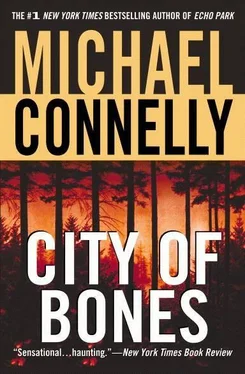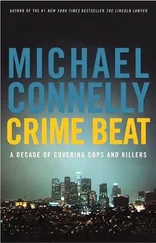“Well, you better have your shit together on this tomorrow because I want a written explanation from you that I can send up the line. Before that report on Four was even over I got a call from Captain LeValley and she said she had already gotten a call from Deputy Chief Irving.”
“Yeah, yeah, typical. Right on down the food chain.”
“Look, you know that leaking the criminal record of a citizen is against departmental policy, whether that citizen is the target of an investigation or not. I just hope you have your story straight on this. I don’t need to tell you that there are people in the department just waiting for you to make a mistake they can sink their teeth into.”
“Look, I’m not trying to downplay the leak. It was wrong and it was bad. But I’m trying to solve a murder here, Lieutenant, and now I’ve got a whole new obstacle to overcome. And that’s what’s typical. There is always something thrown in the way.”
“Then you should be more careful next time.”
“Careful of what? What did I do wrong? I’m following leads where they go.”
Bosch immediately regretted the explosion of frustration and anger. Of those people in the department waiting for his self-destruction, Billets certainly wasn’t on the list. She was only the messenger here. In the same moment, he realized his anger was also self-directed because he knew Billets was right. He should have handled Surtain differently.
“Look, I’m sorry,” he said in a low, even tone. “It’s just the case. It’s got its hooks, you know?”
“I think I do,” Billets answered just as quietly. “And speaking of the case, what exactly is going on? This whole thing with Trent came out of left field for me. I thought you were going to keep me up to date.”
“It all came up today. Late. I was just going to fill you in in the morning. I didn’t know Channel Four would be doing it for me. And doing it for LeValley and Irving as well.”
“Never mind them for now. Tell me about Trent.”
IT was well after midnight by the time Bosch got to Venice. Parking on the little streets near the canals was nonexistent. He drove around looking for ten minutes and ended up parking in the lot by the library out on Venice Boulevard and then walking back in.
Not all of the dreamers drawn to Los Angeles came to make movies. Venice was the century-old dream of a man named Abbot Kinney. Before Hollywood and the film industry barely had a pulse, Kinney came to the marshlands along the Pacific. He envisioned a place built on a network of canals with arched bridges and a town center of Italian architecture. It would be a place emphasizing cultural and artistic learning. And he would call it Venice of America.
But like most of the dreamers who come to Los Angeles his vision was not uniformly shared or realized. Most financiers and investigators were cynical and passed on the opportunity to build Venice, putting their money into projects of less grand design. Venice of America was dubbed “Kinney’s Folly.”
But a century later many of the canals and the arched bridges reflected in their waters remained while the financiers and doomsayers and their projects were long swept away by time. Bosch liked the idea of Kinney’s Folly outlasting them all.
Bosch had not been to the canals in many years, though for a short period in his life after returning from Vietnam he had lived there in a bungalow with three other men he knew from overseas. In the years since, many of the bungalows had been erased and modern two- and three-story homes costing a million dollars or more had replaced them.
Julia Brasher lived in a house at the corner of the Howland and Eastern canals. Bosch expected it to be one of the new structures. He guessed she probably used her law-firm money to buy it or even build it. But as he came to the address he saw that he was wrong. Her house was a small bungalow made of white clapboard with an open front porch overlooking the joining of the two canals.
Bosch saw lights on behind the windows of her house. It was late but not that late. If she worked the three-to-eleven shift, then it was unlikely she was used to going to bed before two.
He stepped up onto the porch but hesitated before knocking on the door. Until the doubts of the last hour had crept in, he had gotten only good feelings about Brasher and their fledgling relationship. He knew he now had to be careful. There could be nothing wrong and yet he could spoil everything if he misstepped here.
Finally, he raised his arm and knocked. Brasher answered right away.
“I was wondering if you were going to knock or stand out there all night.”
“You knew I was standing here?”
“The porch is old. It creaks. I heard it.”
“Well, I got here and then figured it was too late. I should have called first.”
“Just come in. Is anything wrong?”
Bosch came in and looked around. He didn’t answer the question.
The living room had an unmistakable beach flavor to it, right down to the bamboo-and-rattan furniture and the surfboard leaning in one corner. The only deviation was her equipment belt and holster hanging on a wall rack near the door. It was a rookie mistake leaving it out like that, but Bosch assumed she was proud of her new career choice and wanted to remind friends outside the cop world of it.
“Sit down,” she said. “I have some wine open. Would you like a glass?”
Bosch thought a moment about whether mixing wine with the beer he’d had an hour earlier would lead to a headache the next day when he knew he’d have to be focused.
“It’s red.”
“Uh, I’ll take just a little bit.”
“Got to be sharp tomorrow, huh?”
“I guess.”
She went into the kitchen while he sat down on the couch. He looked around the room and now saw a mounted fish with a long sharp point hanging over the white brick fireplace. The fish was a brilliant blue shading to black with a white and yellow underside. Mounted fish didn’t bother him the way the heads of mounted game did but he still didn’t like the eye of the fish always watching.
“You catch this thing?” he called out.
“Yeah. Off Cabo. Took me three and a half hours to bring it in.”
She then appeared with two glasses of wine.
“On fifty-pound test line,” she said. “That was a workout.”
“What is it?”
“Black marlin.”
She toasted the fish with her glass and then toasted Bosch.
“Hold fast.”
Bosch looked at her.
“That’s my new toast,” she said. “Hold fast. It seems to cover everything.”
She sat down on the chair closest to Bosch. Behind her was the surfboard. It was white with a rainbow design in a border running along the edges. It was a short board.
“So you surf the wild waves, too.”
She glanced back at the board and then at Bosch and smiled.
“I try to. Picked it up in Hawaii.”
“You know John Burrows?”
She shook her head.
“Lot of surfers in Hawaii. What beach does he surf?”
“No, I mean here. He’s a cop. He works Homicide out of Pacific Division. Lives on a walk street by the beach. Not too far from here. He surfs. On his board it says ‘To Protect and Surf.’ ”
She laughed.
“That’s cool. I like that. I’ll have to get that put on my board.”
Bosch nodded.
“John Burrows, huh? I’ll have to look him up.”
She said it with just a touch of teasing in her voice.
Bosch smiled and said, “And maybe not.”
He liked the way she kidded him like that. It all felt good to Bosch, which made him feel all the more out of sorts because of his reason for being there. He looked at his wine glass.
“I’ve been fishing all day and didn’t catch a thing,” he said. “Microfiche mostly.”
Читать дальше












